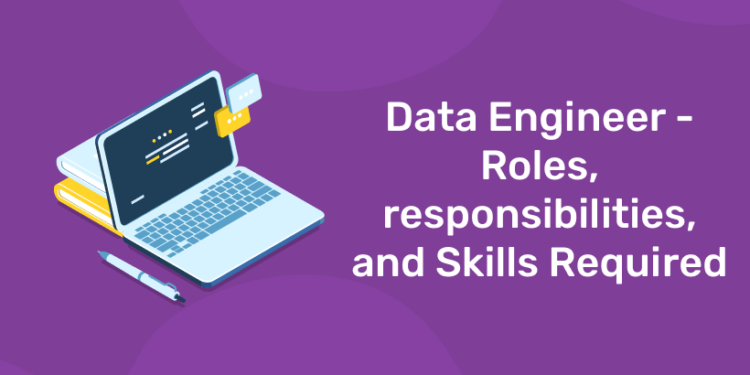We are surrounded by data, which is expanding increasingly every day. This has led to the development of a relatively new area of data engineering, a branch of data science that is solely concerned with gathering, moving, transforming, and storing massive amounts of data. Data engineering is the profession of developing large-scale data collection, storage, and analysis systems. It has applications in practically every industry and covers a broad variety of subjects. Massive volumes of data may be gathered by organizations, but to make sure that it is in a highly useable shape by the time it reaches data scientists and analysts, they require the proper staff and equipment. Data science has a subfield called data engineering that concentrates on real-world usage and data collection. Just as significant as data science is data engineering.
Join our Data Science and Machine Learning course! Enroll Here!
Data scientists and business analysts can use the information created by data engineers’ systems to examine raw data in a variety of scenarios. Their ultimate goal is to make data accessible so that companies may use it to evaluate and enhance their performance. Working in this industry may be tough and rewarding. You’ll be a key player in a company’s success by making it easier for data scientists, analysts, and decision-makers to access the data they require to do their jobs. You’ll depend on your programming expertise and analytical skills to create scalable solutions. Data engineers will always be needed since there will always be data to process.
Data Engineer Roles and Responsibilities
The duties of data engineers typically change based on the sort of business and sector they are employed in. The three basic groups of them, however, are generalist, pipeline-centric, and database-centric.
- Generalist
In small teams, generalist data engineers typically collaborate with scientists and data analysts who have expertise in data science. Data engineers will probably need to perform more end-to-end work, such as seeing that the entire process of ingesting the data, processing it, and engaging in data analysis is completed. This is especially true if they are one of the few or the only data-focused employees at their place of employment.
- Pipeline-centric
Data engineers that are pipeline-centric are frequently found in bigger, medium businesses. They are in charge of collaborating with other data scientists to analyze and use the gathered data. Compared to the generalist data engineers stated before, the demands that larger firms often have to handle are more complicated. Because the task requires a thorough understanding of computer science and data systems, they typically work in teams.
- Database-centric
Some of the biggest businesses and conglomerates employ database-centric data engineers, whose primary responsibility is to set up and populate analytics. The data engineers deal with data warehouses across many databases, and there are frequently massive databases involved.
The following are some of the most typical duties of data engineers:
- Data gathering
- Architecture creation, construction, testing, and maintenance
- Architecture in line with business requirements
- Using tools and a programming language
- Figuring out how to increase the dependability, efficiency, and quality of data
- Using vast data sets to solve business problems
- Data preparation for predictive and prescriptive modeling
- Utilize data to find hidden patterns.
- Detecting discrepancies in the data
Data Engineer Skills
The job of a data engineer is highly technical and necessitates years of experience as well as expertise in fields like computer science, arithmetic, and programming. Big data expertise is also essential for employment in data engineering. Data engineering specialists handle a wide range of activities, from planning, developing, constructing, and managing data pipelines to gathering raw data from diverse sources and guaranteeing performance improvement. They must be knowledgeable with databases, big data frameworks, setting up data infrastructure, containers, and other subjects. Here is a summary of some of the crucial abilities needed to succeed in the profession of data engineering.
“Ready to take your data science skills to the next level? Sign up for a free demo today!”
1. SQL
Because they transfer data all the time, data engineers frequently utilize databases. SQL and NoSQL are the two main categories of database technology (more on NoSQL in the next section). Strong SQL capabilities enable the creation of data warehouses employing databases, their integration with other technologies, and the analysis of that data for commercial reasons. Data engineers may eventually specialize in one or more SQL kinds (such as advanced modeling, big data, etc.), but getting there necessitates understanding the fundamentals of this technology.
2. Python
Python is frequently regarded as one of the most well-liked programming languages. It allows you to automate processes, build data pipelines, integrate systems, and clean and analyze data. Additionally, it is among the most adaptable languages and one of the top options for beginners. As a result of Python’s widespread use, a lot of data engineering tools have it as their back end and frequently support interaction with data engineering activities.
3. Machine Learning Skills
Machine learning integration facilitates massive data processing by identifying trends and patterns. Machine learning algorithms may be used to classify the incoming data; these algorithms may also identify trends and transform the data into insights. To comprehend machine learning, one needs a mathematical and statistical grounding. These abilities may be developed with the use of knowledge of programs like SAS, SPSS, R, etc.
4. Hadoop for Big Data skills
Hadoop is one of the most widely used specialized systems for working with huge data. It is a strong, adaptable, and affordable instrument that has come to represent big data. Every day, businesses and individuals generate enormous volumes of data, which data engineers frequently have to preserve, verify, examine, and assess.
5. Amazon Web Services
The popular cloud computing platform AWS is used by most programmers to boost their adaptability, creativity, and scalability. To create automated data flows, data engineering teams use AWS, therefore you’ll need to be familiar with the creation and deployment of cloud-based data architecture with this platform.
6. Data Visualisation Skills
Big data specialists frequently use visualization tools in their work. The generated learnings and insights must be presented in a way that makes them simple for end users to understand. Tableau, Qlik, Tibco Spotfire, Plotly, and other widely used visualization technologies may all be mastered.
7. Data Modelling Techniques
Understanding how to efficiently construct and operate with databases and warehouses such that they are optimal and scalable is a requirement for data modeling. Using data modeling methods to run data pipelines is a crucial component of data engineering, making this a crucial data engineering talent.
Looking for a Data Science career? Explore Here!
How to become a Data Engineer?
With the right knowledge and abilities, you may begin or advance your career in data engineering. Data engineers often hold a bachelor’s degree in computer science or a closely related field. You may lay the groundwork for the information you’ll need in this rapidly changing sector by acquiring a degree. Consider earning a master’s degree if you want the possibility to advance your profession and have access to jobs with potentially higher earnings. As a foundation for a career in data science, learn the principles of cloud computing, coding, and database architecture. A certification may demonstrate to prospective employers that you have the necessary skills, and studying for a certification test is a great opportunity to advance your knowledge and abilities. A portfolio is frequently a crucial tool in the job search process since it demonstrates your abilities to recruiters, hiring managers, and future employers. Many data engineers begin their careers in entry-level positions like database administrator or business intelligence analyst. You can learn new talents and become qualified for more specialized positions as you acquire experience.
Free Tutorials To Learn
| SQL Tutorial for Beginners PDF – Learn SQL Basics | |
| HTML Exercises to Practice | HTML Tutorial | |
| DSA Practice Series | DSA Tutorials | |
| Java Programming Notes PDF 2023 |
Wrapping Up
The management, optimization, direction, and supervision of data retrieval, storage, and dissemination fall within the purview of a data engineer. They often play one of three types of roles: generalist, pipeline- or database-focused. Data scientists and data engineers are not the same people; data engineers prepare the big data infrastructure.
Data Engineer – Roles, responsibilities, and Skills Required: FAQs
- What competency is most crucial for a data engineer?
A thorough grasp of database design and architecture is essential for data engineering job responsibilities since they frequently include storing, managing, and organizing large amounts of data.
- What are the essential qualifications for a data engineer?
Typically, data engineers have an undergraduate degree in math, science, or a business-related subject.
- Data engineers work where?
This position is more common in larger businesses when data is spread across several databases.
- Do data engineers work with large data?
An information technology (IT) specialist known as a “big data engineer” is in charge of planning, constructing, testing, and maintaining intricate data processing systems that deal with massive amounts of data.










